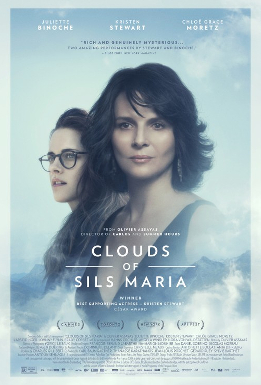Telling a unique story centered around a veteran actress who agrees to take part in a revival of the play that launched her career many years ago, Olivier Assayas' Clouds of Sils Maria is a fascinating character study that stimulates the mind and generates discussion.
Set against the backdrop of mountains and relying heavily on its dialogue and delivery, the film utilizes the talents of both its leads, Juliette Binoche and Kristen Stewart. It often shows great inspiration from the stage as its long scenes build interest, leading audiences to think as they begin to witness life's most fluent interpretation of art.
The film is simple, and the story plays out in perfect time, though it must be said that the multi-layered complexity, while subtle, proves to be the film's most interesting quality. Viewers are constantly left in a state of limbo, feeling off-balance as they work to fully conjugate the events taking place and derive their exact meaning within the context of everything else - much in thanks to the constant metaphors and innuendos used throughout. It is an usual sense of realism, forcing you to dig deep within the conscious of our two leading ladies and understand their joys, fears and views of the outside world.
Stewart's portrayal of Valentine, Marie Enders' (Binoche) assistant, is near flawless, giving Binoche a strong counterpart in what is often a two-person film. Her demeanor and non-verbal cues are on point, pushing the bar high for her co-stars and showcasing a set of skills that, up to this point, have gone unnoticed in the starlet's rather young career.
The film is almost too wise for its own good, showing off its full understanding of the ways of show business, most notably the box in which the industry places women. But the story never appears to be in any sort of hurry, taking its time to unwind, and ultimately refusing to offer up too many answers. That job is left up to the viewer - to interpret the events and form your own conclusions as to the mind, body, spirit and future of those whose stories you are blessed enough to sit in on.
The final scene is quite remarkable as we watch Marie take the stage in a role that she has had a difficult time accepting since the opening act. Her journey, though never officially over, has been quite interesting. Her final exchange with Moretz's Jo-Ann Ellis is filled with awkward tension. Though uncomfortable, it is at this moment that the story comes together. Nothing is laid out clearly, and Assayas works hard to deny you any sort of simplified conclusion. But in a film that lives within the confines of the "˜gray' area, what more is to be expected?

